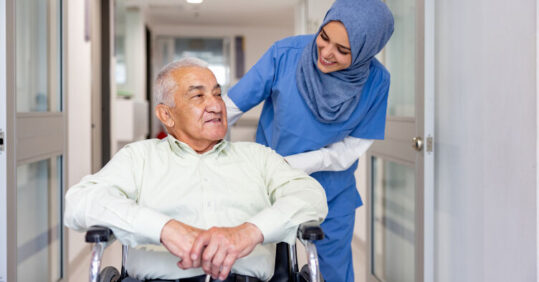British Muslims were ‘left behind’ and faced difficulties accessing healthcare during the pandemic, a new report has revealed.
The findings show a ‘postcode lottery’ of care for Muslims across the UK, with many experiencing problems accessing palliative and end-of-life care.
The published report, a result of a research collaboration between University College London (UCL), the University of Leeds, the Muslim Council of Britain and Marie Curie, highlights pre-existing health inequalities and the disproportionate impact of the pandemic on the health of people from minority ethnic groups.
Related Article: Smoking rates fall most significantly in the North of England
The researchers suggest there needs to be a greater involvement of a diverse range of people in health and social care services in order to tackle inequity in access to care.
One in three people in minority ethnic groups in the UK are British Muslims, making up 4.8% of the total population. Public Health England and Office for National Statistics confirm that minority ethnic groups had the highest rate of Covid-19 deaths and evidence suggests that healthcare issues can arise when healthcare professionals have limited training in faith and cultural values, particularly those related to end-of-life needs.
Members of the British Muslim community were trained as peer researchers and carried out telephone interviews with British Muslims with palliative care needs and their families. Eleven interviews were undertaken by three peer researchers between August and September 2021.
In addition, the online shift of large sections of the health service during the pandemic exacerbated health access issues for many members of the Muslim community as a result of ‘digital exclusion’.
Related Article: Boost your CPD with the redesigned Nursing in Practice 365 platform
Families felt that the cultural needs of British Muslims were not considered in the development of the Covid-19 guidance or its implementation, resulting in an adverse impact on their community.
Where services had worked well, healthcare providers were found to have collaborated with community and faith groups.
Dr Briony Hudson from UCL and Marie Curie said: ‘Services must explore and understand the needs of diverse local communities, including British Muslims, to adapt services and make them more accessible. What is also clear from this research is that more support is needed for those who do not have the support of family networks. It is crucial that those who are isolated or otherwise vulnerable have routes into the support that they need.’
The report also found that healthcare providers must do more to raise awareness of what palliative and end-of-life care services are available to minoritised groups.
Related Article: Thousands of patients not invited to cancer screenings due to ‘incomplete’ GP registrations
Dr Gemma Clarke from the University of Leeds said: ‘British Muslims told us they felt left behind and didn’t know where to turn for help during the most difficult times. We want our work to be used to design better services that properly support the people that need them.’






